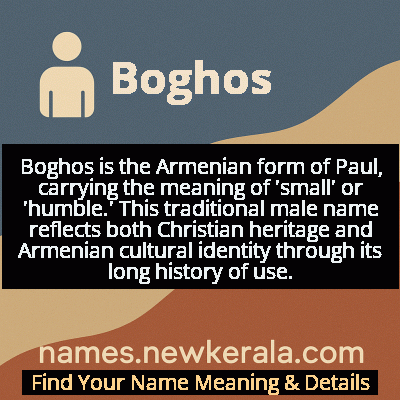Boghos Name Meaning & Details
Origin, Popularity, Numerology Analysis & Name Meaning of Boghos
Discover the origin, meaning, and cultural significance of the name BOGHOS. Delve into its historical roots and explore the lasting impact it has had on communities and traditions.
Name
Boghos
Gender
Male
Origin
Armenian
Lucky Number
3
Meaning of the Name - Boghos
Boghos is the Armenian form of Paul, carrying the meaning of 'small' or 'humble.' This traditional male name reflects both Christian heritage and Armenian cultural identity through its long history of use.
Boghos - Complete Numerology Analysis
Your Numerology Number
Based on Pythagorean Numerology System
Ruling Planet
Jupiter
Positive Nature
Optimistic, inspirational, and creative.
Negative Traits
Scattered, exaggerating.
Lucky Colours
Yellow, gold, purple.
Lucky Days
Thursday.
Lucky Stones
Yellow sapphire.
Harmony Numbers
1, 2, 9.
Best Suited Professions
Arts, writing, communication.
What People Like About You
Creativity, optimism.
Famous People Named Boghos
Boghos Nubar Pasha
Statesman and Diplomat
Founder and first president of the Armenian General Benevolent Union
Boghos Arabian
Military Leader
Armenian general in the Persian army known for military reforms
Boghos Gelalian
Businessman and Philanthropist
Major benefactor to Armenian cultural institutions
Boghos Sabounjian
Educator and Writer
Influential Armenian educator and language preservationist
Name Variations & International Equivalents
Click on blue names to explore their detailed meanings. Gray names with will be available soon.
Cultural & Historical Significance
The name's cultural significance extends to the Armenian diaspora, where it has functioned as a marker of cultural continuity and resistance to assimilation. In communities from Beirut to Los Angeles, Boghos has represented both the preservation of Western Armenian linguistic traditions and the adaptive resilience of Armenian culture. The name carries echoes of the Armenian Apostolic Church's historical role in maintaining national identity, while also embodying the secular intellectual traditions that have characterized modern Armenian thought. This dual heritage makes Boghos a name that speaks to both religious and cultural dimensions of Armenian identity.
Extended Personality Analysis
Individuals named Boghos are typically associated with a combination of intellectual depth and practical wisdom, reflecting the name's historical connection to both scholarly and community leadership roles. They often exhibit a quiet confidence that comes from cultural rootedness rather than outward bravado, embodying the paradoxical strength suggested by the name's meaning of 'small' or 'humble.' This humility is frequently paired with strong convictions and the courage to maintain them in challenging circumstances, mirroring the historical resilience of the Armenian people.
Socially, those named Boghos tend to be bridge-builders who value dialogue and understanding across different perspectives. They often display excellent diplomatic skills while maintaining clear personal boundaries and cultural identity. There's typically a strong sense of responsibility to family and community, combined with intellectual curiosity and respect for tradition. These individuals usually balance respect for heritage with openness to innovation, making them effective in roles that require mediating between old and new, traditional and modern. Their personality often reflects the Armenian cultural ideal of "getting things done" through persistence and relationship-building rather than through confrontation or dramatic gestures.
Modern Usage & Popularity
In contemporary usage, Boghos maintains its status as a traditional Armenian name with particular resonance in Western Armenian communities and among families with strong cultural awareness. While its popularity has declined among younger generations in favor of more modern names or the Eastern Armenian variant Poghos, it continues to be chosen by parents seeking to honor family traditions and preserve linguistic heritage. The name sees steady use in diaspora communities across the Middle East, Europe, and North America, often as a middle name or in combination with more contemporary first names. Recent years have shown a slight increase in its usage as third and fourth generation diaspora Armenians rediscover traditional names, though it remains less common than other Armenian classics. The name's usage patterns reflect broader trends in Armenian cultural preservation, where traditional names serve as conscious markers of identity in increasingly globalized contexts.
Symbolic & Spiritual Meanings
Symbolically, Boghos represents the profound Armenian concept of strength through cultural continuity and adaptive resilience. The name embodies the paradox of finding power in humility, drawing from its literal meaning of 'small' to suggest that true strength lies not in domination but in endurance, wisdom, and the ability to maintain identity under pressure. It symbolizes the Armenian historical experience of preserving language, faith, and culture through centuries of challenge, making it a living connection to ancestral traditions. The name also carries metaphorical significance as a bridge between worlds—between Eastern and Western Armenian dialects, between homeland and diaspora, and between ancient Christian traditions and modern secular life. In choosing this name, families invoke these layers of meaning, seeing in it not just a personal identifier but a statement about cultural survival and the transmission of heritage across generations and geographies.

